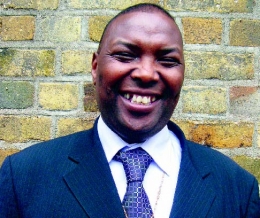An African-led support group in Dublin’s inner city is assisting sub-Saharan Africans and native Dubliners with emotional and addiction issues. CATHERINE REILLY paid a visit on its seventh anniversary
DUBLINER Jason O’Connell stands before those gathered at the Killarney Court community hall in Dublin’s inner city, recalling his redemption from drugs. These walls have absorbed countless such stories, but today’s audience is one with a difference.
Up to 30 Africans sit enraptured, and several stand and share their own experiences, most telling of depression and emotional problems. Several have also travelled the dark path of addiction.
The occasion is the seventh anniversary of Act of Compassion Ministries, a support group founded by Amos Ngugi, a former asylum seeker who seems to have tumbled from the pages of a fairytale. A second-year psychology student, the Kenyan-born pastor brims with sincerity. Ask around: no one has a bad word about him.
A hospital chaplain by profession, Ngugi established the group after he noted significant levels of emotional distress within the African communities – and a lack of information on the dangers of drugs.
Ngugi, who regularly visits asylum seeker centres, says emotional issues are especially prevalent among those in the refugee application process.
“A lot of their problems are due to loneliness, depression, doing nothing in the hostels, and some of them have problems with drugs such as cocaine,” says the Kenyan, who holds a diploma in addiction studies from NUI Galway.
This year, over 400 people have attended Act of Compassion Ministries’ weekend programmes, while some 300 were reached through one-to-one outreach, largely at asylum seeker hostels. Most are suffering emotional problems. The group has a Christian ethos, although participants are of all faiths and none.
Ngugi has also linked up with the North Inner City Drugs Taskforce to distribute thousands of drugs awareness leaflets in foreign languages at asylum seeker hostels, and staged workshops on the dangers of drugs.
“It’s novel, but very real and very useful,” comments Dublin Central Labour TD Joe Costello on Ngugi’s initiative, which he says runs on “tiny” resources.
“His ministry could be brought directly into the State support system, so we’d like to pursue that,” he adds.
Data on the level of addiction among immigrant communities is lacking, a situation as referred to in the new National Drugs Strategy, while the HSE’s intercultural strategy noted fears among asylum seekers that presenting for addiction services could affect their refugee applications.
Costello says “a problem” exists in terms of both drug taking and dealing among non-Irish nationals in the north inner city, but adds: “The fact is that an awful lot of people from the non-Irish communities are based in the north inner city, therefore the situation seems more extensive.”
He says disallowing asylum seekers from “independent living” is a driver behind their addiction and emotional issues.
“You have people in the hostels for long periods of time, they cannot work while their applications are processed, and they are helpless to provide an independent living of their own. They get very frustrated and some turn to things like drugs. ”
Ngugi confides that there are Africans at today’s event who’ve had addiction problems. They’re approached for comments, but none wish to speak publicly. For some, this is because they are in the refugee application process; for others, a social-cultural stigma prevents them from speaking out.
However, the majority are attending Ngugi’s discussion groups because of emotional issues, and gain strength from sharing their problems and seeking solutions. They are more willing to speak.
Williams Gadimoh, a Waterford-based asylum seeker from Nigeria decided to attend the weekend programme due to feelings of isolation. “I was on my own, very down, ” he says. “He tried to encourage me, that I should not feel that everything is gone. So many immigrants are suffering depression – he encourages us.”
His words are echoed by Gaspard Lucky from Burundi, who suffered “some kind of depression” at a point in life. “When I came I really enjoyed it, so I continue to come.”
Others have been assisted in tackling addiction dependencies, including the aforementioned Jason O’Connell from Dublin, who first met Ngugi at a Victory Outreach recovery home.
“He helped me big time, he has a course here every Saturday and Sunday, and I hope he gets more resources,” says O’Connell, who has recovered from addiction to alcohol and cannabis and now works in the cleaning industry.
According to Mick Rafferty, director of Community Technical Aid (CTA), which provides Ngugi with the space for meetings, the Kenyan’s strength is in reaching ethnic minorities who might otherwise suffer in silence.
“Access to a bit of space can be life or death,” says Rafferty. “When ethnic minorities have particular problems, that’s where Amos comes in. He has been able to reach out to them, particularly Africans.”












